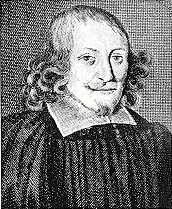- Jean Picard
Infobox Scientist
name = Jean Picard
box_width =
image_width =150px
caption = Jean-Felix Picard (1620–1682)
birth_date =July 21 ,1620
birth_place =La Flèche
death_date =July 12 ,1682
death_place =
residence =
citizenship =
nationality = French
ethnicity =
field =astronomy
work_institutions =
alma_mater =
doctoral_advisor =
doctoral_students =
known_for =
author_abbrev_bot =
author_abbrev_zoo =
influences =
influenced =
prizes =
religion =
footnotes =Jean-Felix Picard (
July 21 ,1620 –July 12 ,1682 ) was a Frenchastronomer and priest born inLa Flèche , where he studied at theJesuit Collège Royal Henry-Le-Grand . He was the first person to measure the size of the Earth to a reasonable degree of accuracy in a survey conducted 1669-70, for which he is honored with a pyramid atJuvisy-sur-Orge . Guided byMaurolycus 's methodology and Snellius's mathematics for doing so, Picard achieved this by measuring one degree of latitude along theParis Meridian using triangulation along thirteen triangles stretching from Paris to the clocktower of Sourdon, near Amiens. His measurements produced a result of 110.46 km for one degree of latitude, which gives a corresponding terrestrial radius of 6328.9 km. The polar radius has now been measured at just over 6357 km. This was an error only 0.44% less than the modern value. This was another example of advances in astronomy and its tools making possible advances in cartography. Picard was the first to attach a telescope with crosswires (developed by William Gascoigne) to a quadrant, and one of the first to use a micrometer screw on his instruments. The quadrant he used to determine the size of the Earth had a radius of 38 inches and was graduated to quarter-minutes. The sextant he used to find the meridian had a radius of six feet, and was equipped with a micrometer to enable minute adjustments. These equipment improvements made the margin of error only ten seconds, as opposed toTycho Brahe 's four minutes of error. This made his measurements 36 times more accurate.Isaac Newton was to use this value in his theory ofuniversal gravitation .Picard also travelled to Tycho Brahe's Swedish observatory, Uraniborg, in order to assess its position accurately to compare Tycho's readings to others'.
Picard collaborated and corresponded with many scientists, including Newton,
Christian Huygens , Römer, Bartholin, Hudde, and even his main competitor,Giovanni Cassini , although Cassini was often less than willing to return the gesture. These correspondences led to Picard's contributions to areas of science outside the field of geodesy, such as theaberration of light he observed while in Uraniborg, or his discovery of mercurial phosphorecence upon his observance of the faint glowing of abarometer . ["Experience faire à l'Observatoire sur la Barometre simple touchant un nouveau Phenomene qu'on y a découvert", "Le Journal des Sçavans" [later: "Journal des Savants" ] , page 126 (25 May 1676). See also: "Sur la lumière du baromètre" [On the light of the barometer] , "Histoire de l'Académie Royale des sciences de Paris", pages 202-203 (1694). For further information, see:Barometric light .] This discovery led to Newton's studies ofspectrometry .Picard also developed the system of
right ascension for measuring positions of celestial objects in relation to the Earth.His book "Mesure de la Terre" was published in 1671.
There is a lunar crater named after Picard, on the northwest quadrant of
Mare Crisium .The PICARD mission, an orbiting solar observatory, is named after Picard.
Footnotes
External links
*MacTutor Biography|id=Picard_Jean
*CathEncy|wstitle=Jean Picard
Wikimedia Foundation. 2010.
